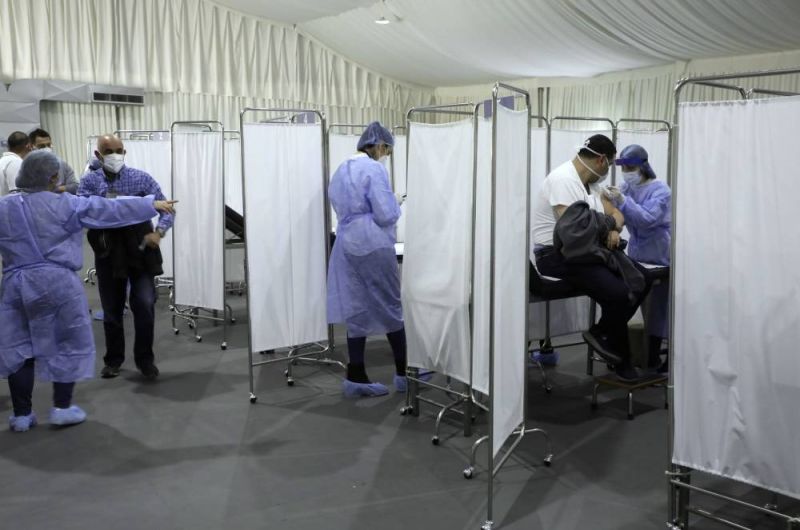
A man receives a dose of the Pfizer/BioNTech vaccine against COVID-19 at St. George Hospital in Beirut. (Credit: Mohamed Azakir/Reuters)
Want to get the Morning Brief by email? Click here to sign up.
Spirits were high in Lebanon’s hospitals after the start of the first full week of vaccinations for COVID-19. Most receiving the Pfizer-BioNTech inoculations yesterday were front-line medical workers, as per the country’s national vaccination campaign, while a small number of the elderly also received doses. Just over half a million people have registered for the vaccine so far, less than 10 percent of the population. While hopes are high, the vaccination campaign is expected to be lengthy. Numbers at medical facilities are still critical, with ICU hospitalizations increasing to 944 yesterday as the virus claimed 44 more lives.
Activists hit the streets of Beirut again to demonstrate against the continued detention of protesters arrested last month in Tripoli. Demonstrators rallied yesterday outside the Military Tribunal, returning to the site of Friday’s heavy-handed response by security forces to a protest. The secretive military court is detaining civilians who joined the latest wave of protests in Tripoli against deteriorating living conditions amid the COVID-19 lockdown. A group of activists also briefly blocked the highway leading out of the capital near the port in solidarity with the detained Tripoli demonstrators.
Two parliamentary committees will meet at 10 a.m. today to hash out a draft law to enable a World Bank project for social safety nets in the country. The World Bank greenlit the $246 million program, which centers around direct cash assistance to nearly 150,000 vulnerable households, on Jan. 12. While the caretaker finance minister inked the loan contract on Jan. 29, it still needs parliamentary approval. The draft includes a controversial provision to disburse cash at the below-market rate of LL6,240 to the US dollar, according to MP Ibrahim Kanaan, the head of parliament’s finance committee. Once the draft is approved by the legislature’s committees for finance and social affairs, it will go to the floor of Parliament in a yet-unscheduled session.
Lebanon could suffer from internet disruptions today, according to the country’s main internet provider. The state-run Ogero telecom firm cautioned that web services could be disrupted due to maintenance work in Marseilles on the India-Middle East-Western Europe (IMEWE) submarine communications cable system. The company, which boasts it serves as the backbone infrastructure of all telecoms networks in Lebanon, apologized in advance for any problems and said its technical teams would be working to divert data traffic.
A new winter storm is forecast to begin gathering in Lebanon today, bringing winds up to 70 kilometers per hour, strong sea waves and dust in the air. The storm, named “Joyce,” will see temperatures drop while rains begin tonight and last through the end of the week, according to the meteorology department at Beirut’s Rafik Hariri International Airport. Storms in Lebanon routinely expose state failures to maintain infrastructure, with flooding on roads a recurring phenomenon.
Hassan Nasrallah will take to the airwaves again tonight in a speech set to delve into local politics. The Hezbollah leader’s speech at 8:30 p.m. comes on the occasion of the party’s yearly commemoration of past assassinations of its top leaders, including the Feb. 16, 1992, Israeli airstrike on its then-Secretary-General Abbas al-Moussawi. Nasrallah’s last speech was on Jan. 8, when he spoke about the Aug. 4 Beirut port explosion and politics, among other topics.
Today marks the 36th anniversary of Saida’s liberation from Israeli occupation. On Feb. 16, 1985, the Israeli military withdrew from Saida after being stationed in the city since June 6, 1982 — a period of nearly 1,000 days. Israel’s invasion of Lebanon in June 1982 led to the death of at least 17,825 people, according to a survey of records by An-Nahar newspaper in September of that year.